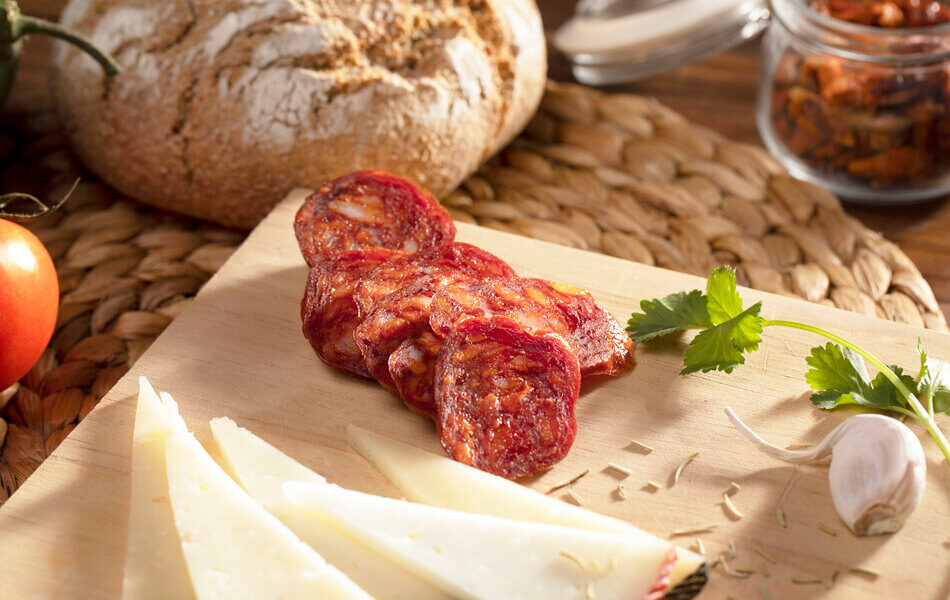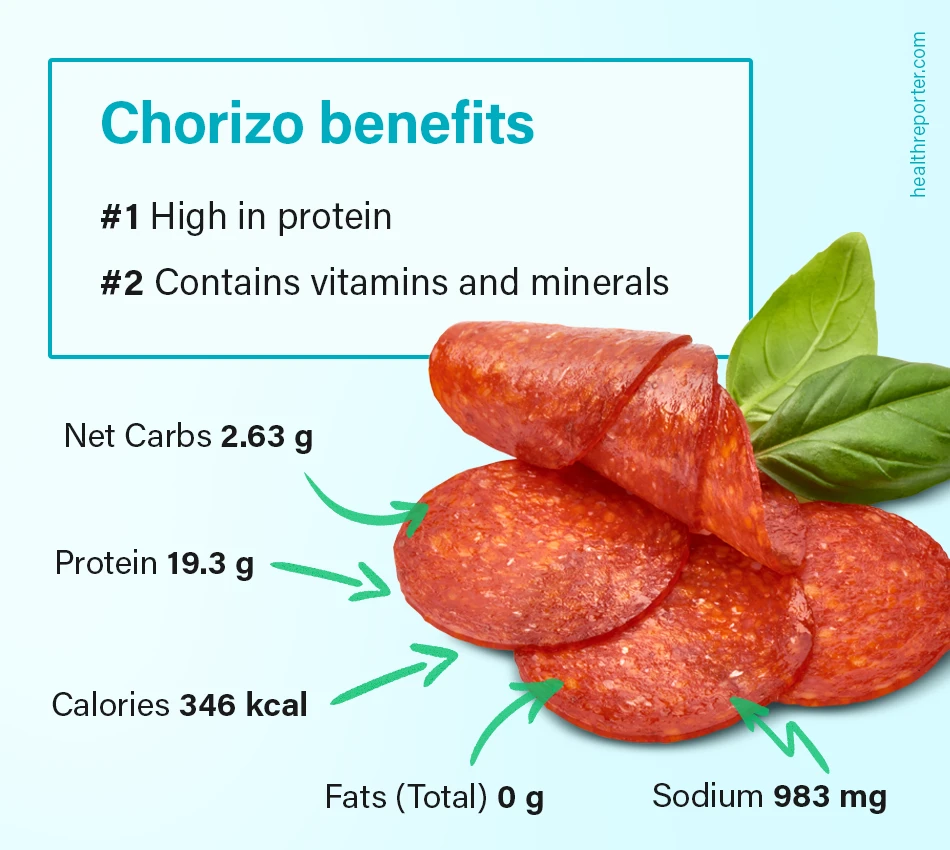Is Chorizo Healthy? Nutrition, Calories And Plant-based Alternatives
Chorizo is a spicy pork sausage used in Mexican and Spanish cooking. Let’s take a look at its nutritional information and whether it can be a part of a healthy and balanced diet.

Have you been dreaming about the popular Mexican chorizo? With its spicy sausage flavor and versatility, chorizo is tasty in dishes from omelets to casseroles to tacos and more! The list is endless.
You can even find a plant-based version of chorizo at popular restaurants, including Chipotle Mexican Grill, as one of their protein options.
However, are there reasons to limit your consumption of chorizo or even avoid it altogether? Read on to learn more.
Is Chorizo Healthy?
While it has protein, vitamins, and minerals such as iron and potassium, Spanish chorizo is not healthy. It is a type of red meat that is high in fat, sodium, and cholesterol. Instead, focus on lean meats, such as poultry, fish, or plant-based protein.

Chorizo benefits
Here are some of the benefits of consuming this Spanish sausage.
#1 High in protein
Chorizo is quite high in protein, with 19 grams of protein per 100 g of chorizo. Protein is essential for muscle growth and repair, as well as for many other metabolic processes.
#2 Contains vitamins and minerals
Chorizo is also a good source of iron. Iron is an essential mineral that helps transport oxygen around the body and helps muscles store and use oxygen. Iron is also important for brain health, as it helps the brain produce neurotransmitters.
Additionally, chorizo is also rich in vitamin B12, which is an essential vitamin for energy production, as well as for the formation of red blood cells. A single serving of chorizo can provide up to 30% of the daily recommended intake of vitamin B12.
Chorizo Downsides
While it is a delicious and flavorful ingredient, there are some potential downsides to eating chorizo.
#1 High in sodium
A 100g serving of chorizo sausage contains approximately 983 mg of sodium, which is more than one-third of the recommended daily allowance (RDA) of 2,300 mg per day. Excess sodium consumption has been linked to high blood pressure and an increased risk of heart attack.
#2 High in saturated fat
Chorizo sausage contains a high amount of fat. A single 100g serving of chorizo contains approximately 26g of fat, with 9g of saturated fat. Consuming too much saturated fat can increase the risk of developing heart disease and stroke.
#3 High in calories
A single serving of chorizo sausage contains approximately 346 calories, which is a significant portion of the average person’s daily calorie requirements. Eating too many calories can lead to weight gain and an increased risk of developing obesity-related illnesses, such as type 2 diabetes.
Chorizo Nutritional Facts
From beneficial vitamins and minerals to dangerous fats, let’s discuss more information about the nutritional facts of chorizo.
Nutritional table (per 100g)
| Calories/Nutrient (per 100g) | Amount |
| Calories (kcal) | 346 |
| Sodium (mg) | 983 |
| Net Carbs (g) | 2.63 |
| Fiber (g) | 0 |
| Sugar (g) | 0 |
| Fats (Total) | 26 |
| Protein (g) | 19.3 |
| Cholesterol (mg) | 107 |
High in calories
A 100g serving of chorizo, which is just under two-thirds of a cup of meat, contains a whopping 346 calories. Therefore, chorizo sausage is a high-calorie food.
For a lower calorie protein option, it is best to stick with poultry, fish, or a plant-based protein, such as tofu.
Low in carbohydrates
Since chorizo is a meat and protein source, it is naturally extremely low in carbohydrates. For example, a 100g serving of chorizo only contains less than 3g of carbohydrates.
Chorizo contains no sugar whatsoever. However, it also does not have any fiber. Fiber helps you feel full and satisfied after a meal.
If you want to add fiber to your chorizo dish, eat it with whole-wheat tortillas and pair it with fiber-rich vegetables such as bell peppers, carrots, broccoli, and more.
High in fats
A significant drawback of chorizo is the high total fat content, especially in saturated fat and trans fat.
According to the American Heart Association, 100g of chorizo contains almost 10g of saturated fat, which can contribute to high cholesterol levels and increase the risk of heart disease.
Only 5–6% of your caloric intake should be from saturated fat. For example, if you consume 2,000 calories daily, less than 120 calories should come from saturated fat.
However, of the 26g of fat in a 100g serving of chorizo, about 12g are monounsaturated fats, and approximately 5g are polyunsaturated fats.
Since the risks of saturated fat and trans fat in chorizo are much greater than the potential benefits of the unsaturated fat, it is best to stick with plant-based proteins, poultry, or fish instead of red meat.
High in cholesterol
As mentioned above, a 100g serving of chorizo contains 107mg of cholesterol.
Cholesterol is a type of fat naturally made in the liver of animals and humans. Since our bodies can make it, we do not need to eat any cholesterol to survive.
However, we also get cholesterol when we eat animal products, including meat and dairy. Too much cholesterol can increase heart disease risk, including high blood pressure, atherosclerosis, and more.
While the recommendation was to consume no more than 200–300mg of cholesterol each day, the Dietary Guidelines for Americans now recommends consuming as little dietary cholesterol as possible, similar to trans fats.
A Word From a Dietitian
Delicious sausage chorizo is best consumed in moderation due to its fat content (including small amounts of trans fat), extremely high sodium content, and cholesterol.
However, chorizo is a good source of amino acids, iron, and potassium, amongst other beneficial vitamins and minerals. Therefore, in the case of chorizo, the downsides may outweigh the benefits as you could get protein and nutrients from other more nutritious sources.
When you enjoy chorizo sausage, try to make it at home to control precisely how much salt and fat, such as oil, is added to the meal.
If you enjoy chorizo’s spicy sausage and a savory flavor, I suggest you try out healthier, plant-based versions. Since they are usually pea protein-based, plant-based chorizo contains significantly less fat and cholesterol but still high amounts of salt.
FAQs
Due to high sodium, cholesterol, and fat content, including saturated fat and trans fat, chorizo used in Mexican and Spanish cooking is not very healthy. Therefore, chorizo should be consumed in moderation and in small amounts.
A 100g serving of pork chorizo, equivalent to a little under two-thirds of a cup of meat, contains 983mg of sodium, which is exceptionally high. The American Heart Association recommends more than 2,300mg per day.
Chorizo is high in both saturated fat and cholesterol. Therefore, it is best to limit consumption of chorizo, especially if you are trying to manage your cholesterol levels.
Yes, plant-based chorizo is generally considered to be healthier than traditional pork chorizo. Plant-based chorizo is usually lower in fat and calories and is free of cholesterol and saturated fat.
Conclusion
Chorizo can be a part of a healthy and well-balanced diet, as long as it is consumed in moderation in small amounts. Try to opt for more lean meats, such as poultry or fish, rather than processed meats, such as salami or chorizo.
Add your chorizo to a meal that is plentiful in whole grains, vegetables, fruits, and dairy to have a well-rounded dish.
If you’re struggling with maintaining a healthy diet, you can always download a macro-tracking app to help you out.

















































 Select your language:
Select your language: 








